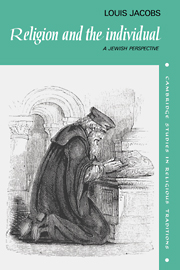Book contents
- Frontmatter
- Contents
- Preface
- List of abbreviations
- 1 Individual significance
- 2 Self-realization as a religious value
- 3 Attitudes to life and death
- 4 Family relationships
- 5 Loving the neighbour
- 6 Communal obligations
- 7 God and the soul
- 8 Does a person's body belong to God?
- 9 Worship with the body
- 10 God and personal freedom
- 11 Immortality
- 12 Conclusion: A question of emphasis
- Glossary
- Notes
- Bibliography
- Index
11 - Immortality
Published online by Cambridge University Press: 11 October 2009
- Frontmatter
- Contents
- Preface
- List of abbreviations
- 1 Individual significance
- 2 Self-realization as a religious value
- 3 Attitudes to life and death
- 4 Family relationships
- 5 Loving the neighbour
- 6 Communal obligations
- 7 God and the soul
- 8 Does a person's body belong to God?
- 9 Worship with the body
- 10 God and personal freedom
- 11 Immortality
- 12 Conclusion: A question of emphasis
- Glossary
- Notes
- Bibliography
- Index
Summary
Ultimately the question of the significance of the individual in Judaism can best be discussed by considering his part in the Jewish eschatological scheme. What has to be examined in this chapter is how Jewish teaching treats the doctrine of the immortality of the individual soul. In this area much is highly speculative but it is possible to trace briefly the history of the doctrine from the Biblical period onwards.
The virtual silence on the whole question of individual immortality in the Bible has often been noted. As Salo Baron remarks:
Entire libraries could be filled with writings on the Old Testament doctrine of the Hereafter, even more than ordinarily contrasting with the paucity of the biblical statements themselves. This is not altogether surprising when one considers the enormous role this doctrine was to play in the subsequent world outlook of Judaism and its daughter religions.
Of the two great civilizations which formed the background to the Biblical texts, the Babylonian and the Egyptian, there was a marked difference on the doctrine of the Hereafter. In the Babylonian religion in its official aspects the doctrine occupied a very secondary place, while in the Egyptian religion the doctrine was prominent, as can be seen from the evidence of the tombs filled with objects the deceased would need. As W. B. Emery puts it, the Egyptians believed that ‘you could take it with you’.
- Type
- Chapter
- Information
- Religion and the IndividualA Jewish Perspective, pp. 94 - 112Publisher: Cambridge University PressPrint publication year: 1992



